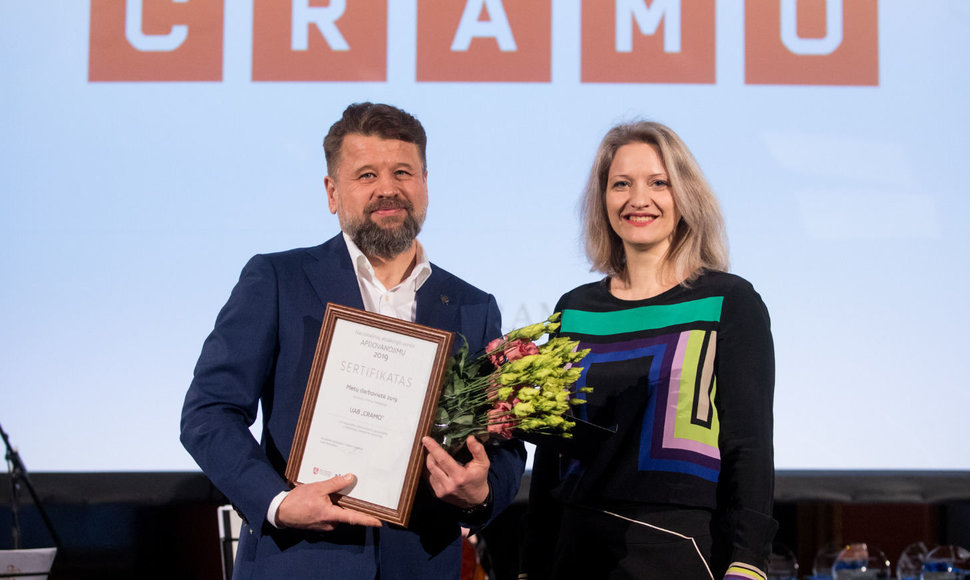Among the best
In the January 30 National Responsible Business Awards (NAVA) held at the Palace of the Grand Dukes by the Ministry of Social Security and Labour, companies that most contributed to the application of social responsibility and nurture in their areas in 2019 were honoured. The NAVA initiative seeks to increase awareness of the benefit of social responsibility to businesses, our country and every individual.
“In this life, everything is related. Caring for the environment, communities and employees contributes to the creation of the country you live in. This is also valuable for the companies themselves because qualified and dedicated staff want to work with a responsible employer, good information about companies spreads by word of mouth. IN essence, this way a reputation is created for them and this works best when socially responsible behaviour is voluntary and based on value,” Minister of Social Security and Labour Linas Kukuraitis said when handing the main award.
This year, all companies competed in four nominations: Workplace of the Year, Most Communal Company of the Year, Most Environmentally Friendly Company, Most Family-Friendly Company. The Workplace of the Year award in the mid-sized companies category was obtained by the equipment rental service company Cramo for the nurture of inclusive workplace culture and the encouragement of staff improvement.
This nomination and also the victory itself, according to the company’s CEO Darius Norkus, is not just an excellent evaluation, but also evidence that work culture is experiencing a renaissance – finally, value and human criteria hold no less critical a position than financial benefit.
Individual training and sports centres for those seeking to improve
Cramo employs almost 100 staff across Lithuania, thus according to D. Norkus it firstly seeks for the privileges provided to match their staff’s individual needs. The company’s principal value is the development of dialogue and ensuring opportunities for employee growth.
“We are oriented to our people’s improvement, growth in their competences, improvement of their skills. Last year, we began a three-year-long staff training project, which we named Cramo Academy. All staff interested in obtaining specialised knowledge and skills directly or indirectly related to their work functions can participate in the project. For example, they can study micro or macroeconomics, business ethics, management and other areas,” D. Norkus explains.
The company also dedicates particular attention to its employees’ health; those working here are granted extra health insurance. Furthermore, in Vilnius, next to the main administrative building, Cramo runs its own sports club, where everyone is encouraged to improve their physical condition.
“I am convinced that active and consistent sporting contributes to not only physical health but also emotional health improvements. Our staff can exercise practically without leaving the workplace, thus also save their precious time. Our team does not obstruct enjoying this privilege, and we celebrate the excellent return communication,” the leader says.
Seek benefits that motivate staff
Beyond the primary standards based on social responsibility principles, Cramo also operates based on further programmes, which ensure their staff’s social welfare. Those working here can choose their work schedule, depending on their work position are granted the opportunity to work remotely. Also, the company operates a supplementary financial aid policy. In some instances – with a relative’s or employee’s death, with childbirth – staff are issued a grant.
“We are an open company – we constantly watch our staff’s satisfaction, nourish a strong internal communication, share the company’s results, plans and ideas. All staff can and are encouraged to express their opinion and proposals,” the company head says.
According to him, contemporary employers must nurture and value their staff’s loyalty, and this demands a respective view of people as specialists and of people as personalities. To this end, the company employs the measure Cramo Dialogue, which helps set personal improvement goals, select activity priorities and plan further steps.
“By setting time for uncovering our employees’ demands and pursuits, we not only find them but also do our all so that their personal goals are really achieved and everyone at work feels good and secure. I believe it is the duty of every responsible business,” D. Norkus says.












